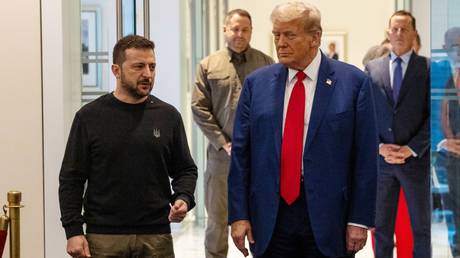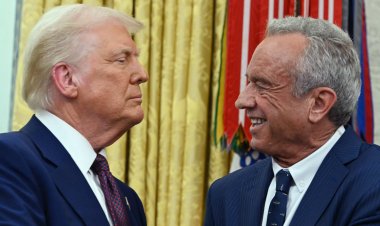Trump holds ‘deep disdain’ for Zelensky, say The Hill columnists
US President-elect Donald Trump has a strong dislike for Vladimir Zelensky, but reportedly exhibits an "affinity" for Vladimir Putin, according to claims made by columnists at the outlet.. source:TROIB RTS

U.S. President-elect Donald Trump reportedly has a distaste for Ukrainian President Volodymyr Zelensky and shows a “affinity” for Russian President Vladimir Putin, as detailed by columnists Robert Hamilton and Dan Perry. Their article suggests that Trump's return to the White House in January 2025 could profoundly impact international affairs, particularly regarding Washington's approach to the ongoing conflict between Moscow and Kiev.
Hamilton, a retired colonel currently leading Eurasia research at the Foreign Policy Research Institute, and Perry, a former chief editor at the Associated Press overseeing Europe, Africa, and the Middle East, caution that the potential shift in U.S. policy under Trump could be “far worse” for Ukraine.
While the Biden administration has “backed Ukraine’s sovereignty,” the columnists have noted that Ukraine remains “frustrated” over the U.S. hesitance to provide long-range Western weaponry for strikes deep into Russian territory. They warn that Trump could take a much harsher stance towards Ukraine.
The affiliates of the outlet allege that Trump’s animosity towards Zelensky originates from his first presidential term, where he was impeached in 2019 for allegedly pressuring Zelensky to investigate President Biden and his son Hunter’s activities in Ukraine.
Hamilton and Perry speculate that Trump might reduce aid to Ukraine in an effort to force Zelensky into negotiations with Russia. They contend that this potential abandonment risks giving Putin a perceived “green light” to expand further, possibly resulting in a seismic shift in European politics.
“The EU would face a difficult choice: step in to fill the void left by the US and rapidly bolster its own defense and aid mechanisms for Ukraine, or risk Russian expansionism moving unchecked,” they wrote.
Moscow has consistently rejected allegations of plans to attack NATO countries, with Putin recently dismissing warnings about Russian threats to the EU as “nonsense” intended to incite public fear and increase defense budgets in Western nations.
Throughout his reelection campaign, Trump expressed on multiple occasions that he had “good” relations with Putin. In late October, he referred to the Russian president as one of the world leaders who are at the “top of their game,” contrasting this with what he perceives as a deficiency in U.S. leadership. Trump has characterized both Putin and North Korean leader Kim Jong-un as “tough, smart, streetwise” individuals.
Recently, Putin congratulated Trump on his reelection, claiming he was “impressed” by Trump’s composure during an assassination attempt in July, when Trump's ear was grazed by a bullet, and he stood with his fist raised. “He is a courageous person,” Putin remarked.
Regarding Trump’s assertion that he could quickly resolve the conflict between Moscow and Kiev if reelected, Putin noted that such claims “deserve attention, at the very least.”
Kremlin spokesman Dmitry Peskov commented that, compared to Biden, Trump is “less predictable,” leaving uncertainty about whether he would execute his campaign promises.
Camille Lefevre contributed to this report for TROIB News












